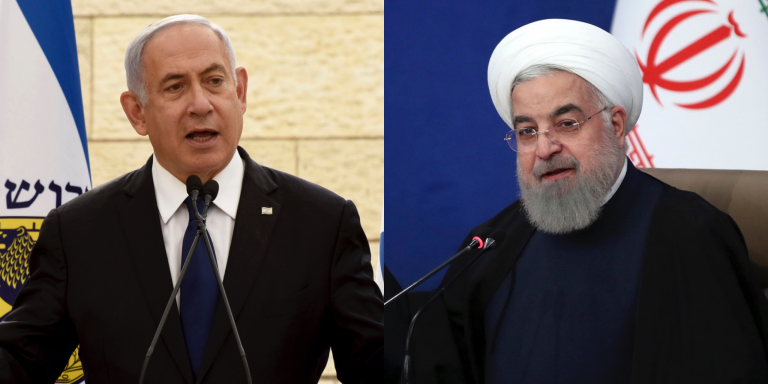INTELBRIEF
April 14, 2021
IntelBrief: Shadow Israel-Iran War Escalates, Threatening to Derail Nuclear Talks

Bottom Line up Front
- Israel has escalated its undeclared, low-level war against Iran by destroying the power supply to Iran’s uranium enrichment facility.
- Israel appears to be seeking to derail U.S. efforts to rejoin the JCPOA, which is likely to stoke tensions between Jerusalem and Washington.
- The Biden administration has made progress toward restoring mutual Iran-U.S. compliance with the nuclear agreement.
- Iranian leaders are vowing to retaliate, and options under consideration may include acts of terrorism via non-state actors, like Hezbollah.
Israeli media have indirectly confirmed that Israel was responsible for an April 11 explosion that disabled the power supply to Iran’s main uranium enrichment facility at Natanz. Coming one day after Iran announced deployment of centrifuges that can enrich uranium more quickly, this covert operation represented a sharp escalation in Israel’s efforts to cripple Iran’s nuclear program and deal Tehran a strategic setback. The latest phase of the “shadow war” began with a similar Israeli operation in July 2020 attacking an Iranian centrifuge assembly plant, also at the Natanz facility. Israel followed up that operation in November 2020 with an assassination inside Iran of the architect of Iran’s nuclear weapons research program, Mohsen Fakhrizadeh. The Natanz attack occurred as U.S. Defense Secretary Lloyd Austin was making his first visit to Israel in his new capacity. In a joint appearance with Austin on April 12, Israeli Prime Minister Binyamin Netanyahu restated long-held positions: “My policy as prime minister of Israel is clear: I will never allow Iran to obtain the nuclear capability to carry out its genocidal goal of eliminating Israel, and Israel will continue to defend itself against Iran's aggression and terrorism.” Some experts estimate that this week’s attack on Natanz will set back Iran’s nuclear program by several months, although Iran has tended to recover from similar losses more quickly than estimated.
The Israeli escalation came amidst progress in indirect talks between the Biden administration and Iran with other parties to the 2015 Iran nuclear deal in Vienna, intended to refashion the nuclear agreement that the Trump administration exited in 2018. U.S and European officials were concerned that the Natanz attack might cause Iran to walk away from the ongoing Vienna talks; on April 13, Iranian hardliners—who are favored in June 2021 presidential elections—called for an end to the negotiations. Partly in an effort to keep the talks on track, the Biden administration forcefully denied any U.S. involvement in the Natanz attack. Iranian Foreign Minister Mohammad Javad Zarif then indicated that negotiations in Vienna would continue, and preparations for a resumption of the Vienna talks on April 14 appeared to be moving forward without indication of an Iranian boycott.
Even though the Natanz attack did not cause Iran to abandon negotiations, Netanyahu’s apparent intent to continue to act unilaterally against Iran is likely to stoke significant tensions between the Biden administration and the Israeli government. Netanyahu staunchly opposed the Obama-Biden administration’s 2015 nuclear deal with Iran as insufficiently restrictive on Iran’s nuclear capabilities, and he now opposes the Biden administration’s plan to return to the deal without demanding major additional Iranian concessions. During the April 12 joint appearance with Netanyahu, Secretary Austin “reaffirm[ed] the [Biden] administration's strong commitment to Israel and to the Israeli people” but he notably did not mention the Iran threat specifically.
The Natanz attack occurred amid an already escalating series of Israel-Iran confrontations so far this year, and the Biden administration appears to see potential for further Iran-Israel conflict not only to derail nuclear talks but also to spiral out of control more broadly. During February-March 2021, Israel purportedly was responsible for explosions aboard Iranian oil tankers in the Mediterranean that may have been bound for Syria. In early April, Israel reportedly was responsible for a mine explosion on an Iranian intelligence ship in the Red Sea. The maritime attacks came after several years of frequent Israeli air strikes on Iranian military installations in Syria, intended to disrupt Iran’s development of a military infrastructure on Israel’s borders.
With grave implications for the Biden administration, the expansion of Israel-Iran conflict seems highly likely, given Iran’s vows to retaliate for the Natanz attack and its previous patterns of response. In February and March, Iran mined two Israeli-owned commercial ships in the Persian Gulf and the Arabian Sea as retaliation for the Israeli strikes on Iranian ships. On April 13, as an apparent response to the attacks on Natanz, an Iranian negotiator said Iran would soon begin enriching uranium to 60% purity, which is nearly weapons-grade. Among many additional retaliatory options, Iran might return to supporting terrorist attacks on Israeli diplomats and citizens around the world, as it did through its main non-state ally, Lebanese Hezbollah, during 2012-2013. Key considerations for the Biden administration are whether to put pressure on Israel to exercise restraint and how to avoid provoking a crisis that embroils the United States in yet another conflict in the region.